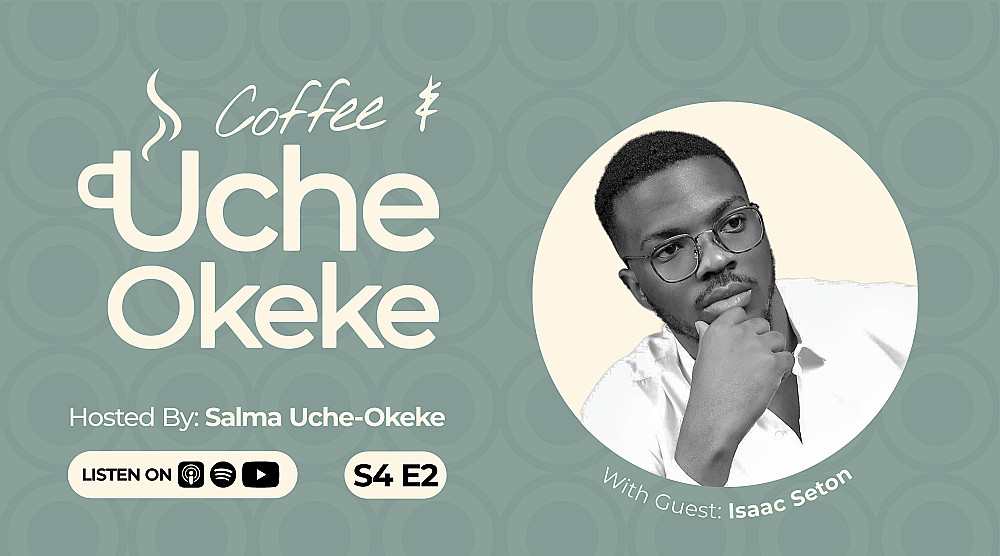Creativity Without Strategy Fails | Isaac Seton | S4E2

Published 17 October 2025 in Podcast
Artfundi Editorial
Key insights
- Creativity is a disciplined habit of mind, not just the act of making art.
- Identity is a competitive advantage: Nigerian roots and local references (e.g., Badagry) can travel globally without dilution.
- Ideas need structure: strategy, distribution and leadership convert inspiration into outcomes.
- Technology, including AI, is a tool to accelerate work—not a substitute for human intent.
The Episode At A Glance
Host Salma Uche‑Okeke speaks with Isaac Seton (also known as Navide Sai), a project manager and performing artist working at the intersection of business and culture. Across the conversation, Seton outlines a model for creative work that marries originality with execution and situates Nigerian creativity within a global frame without losing its centre.
Creativity as principle, not pastime
For Seton, creativity is “the birth of your mind,” which is the disciplined practice of turning thought into something new, whether that is a song, a business concept, or a programme. It begins with self-investment:
- time spent thinking clearly.
- making connections
- strengthening one’s internal compass
This is not a narrow definition of art but a standard for living and working that insists on novelty with purpose.
Identity, authenticity, and global reach
Seton’s catalogue blends Afrobeats with R&B and other textures, yet he resists the obvious template. The “African touch”—whether heard in drum patterns, articulation, or imagery—remains the core element, not a surface flourish. Even his interest in foregrounding Badagry signals that locality can be a strategic asset, a way to carry history into contemporary work without retreating into nostalgia. The result is music and branding that read as distinctly Nigerian while speaking to a wider public.
Creativity needs strategy
In Seton’s words, creativity “births” possibilities; strategy gives them direction. He describes how leadership roles at university forced him to think beyond the studio, to organise people and plans, and to treat distribution not as an afterthought but as audience development and timing as part of the work. Without this, ideas tend to scatter; with it, they compound. It is a practical reminder that the most valuable projects pair imagination with project management, budgets, and measurable goals.
Technology as a tool, not a substitute
On AI and digital tools, Seton is clear: treat them as instruments that speed processes and improve quality control, much like Photoshop became standard in photography. They compress timelines but cannot replace authorship, intent, or the lived meaning behind a lyric or visual. The craft remains human; the tools extend its reach and efficiency. The question is not whether to use them, but how to use them well and transparently.
A value chain from idea to influence
Seton offers a concise value chain for creatives: first, allow wide experimentation and expressive freedom; next, prioritise collaboration over rivalry; then design distribution with care (platform choice, timing, metadata, rights); finally, reinvest back into local ecosystems through mentorship, training and infrastructure. This is how singular works become sustainable careers and, eventually, legacies. It also mirrors Professor Uche Okeke’s synthesis of tradition and modernity: move forward but remain anchored.
A closing image
Asked to picture a single scene that reflects his values, Seton imagines an outdoor gathering under trees: family, collaborators and a diverse crowd sharing coffee, calm, and good humour. It is convivial rather than glossy. A portrait of community, reflection, and quiet confidence. The image encapsulates his thesis: identity first, then collaboration, then distribution and return. It is also a reminder that legacies are built with people, not platforms alone.
Why this episode matters
For young creatives, the lesson is to pair a distinct voice with disciplined execution and to treat technology as an aid, not a crutch. For institutions, the call is to provide secure, integrated, data-driven frameworks that respect artists’ intent and make circulation both efficient and accountable. When those elements meet, authentic work travels further and endures.
References
· Lagos - Wikipedia – Mentioned as a cosmopolitan hub comparable to global cities.
· Badagry - Wikipedia – Referenced in connection with heritage and identity.
· Mayer'sche Hofkunstanstalt - Where Uche Okeke went to learn the art of stained glass.
· Negritude - movement and African-American artistic expression.
· Post-colonial countries – Referenced collectively in the context of cultural self-definition after independence.
